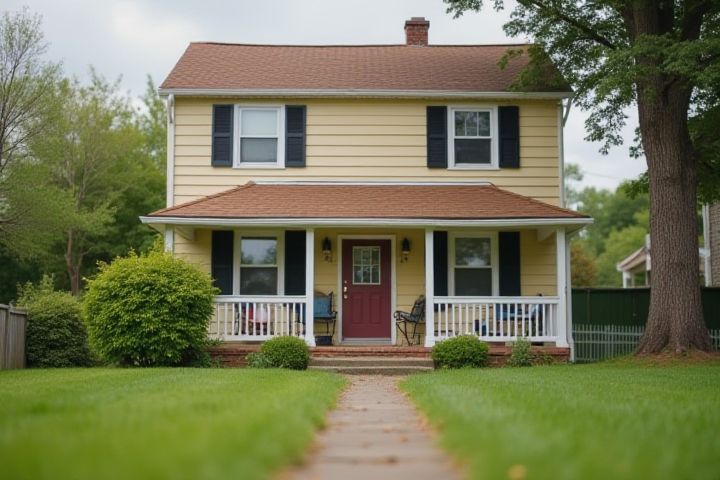
Flipping a house for profit involves purchasing a property at a lower price, renovating it, and subsequently selling it at a higher price. Start by identifying undervalued properties in desirable neighborhoods, utilizing tools like real estate listings and market analysis. Budget for essential renovations such as kitchen upgrades, bathroom remodels, and landscaping improvements to boost the property's curb appeal and overall value. Collaborate with reliable contractors and real estate agents to navigate the renovation process and market your home effectively. By carefully timing your sale to align with the housing market trends, you can optimize your return on investment.
How To Flip A House For Profit
Conduct thorough market research
Conducting thorough market research is essential for successfully flipping a house for profit. Begin by analyzing local real estate trends, focusing on neighborhoods with rising property values and low inventory levels, as these factors can boost your profit margins. Utilize online platforms and resources such as Zillow or Realtor.com to gather data on comparable sales, average days on market, and renovation costs in your targeted area. Engaging with local real estate agents and attending community open houses can offer additional insights into buyer preferences and emerging market opportunities.
Create a detailed budget
Creating a detailed budget is essential for successfully flipping a house for profit. Start by estimating the purchase price, which often averages around $200,000 to $500,000, depending on the market. Allocate approximately 20-30% of the budget for renovation costs, factoring in materials, labor, and unexpected expenses; for example, if your purchase price is $300,000, you might budget $60,000 to $90,000 for renovations. Don't forget to include carrying costs like utilities, property taxes, and insurance, which can add up to 1-2% of the property's value per month, ensuring a thorough financial plan that maximizes your return on investment.
Secure financing options
Secure financing options are crucial for successfully flipping a house and maximizing your profit margins. Many investors opt for hard money loans, which typically cover 70% to 80% of the property's purchase price, enabling swift access to capital. You can also explore traditional mortgages with favorable interest rates, often around 3% to 4% for well-qualified buyers, allowing for a healthier cash flow. Private lenders or crowdfunding sources might offer more flexible terms, ensuring you have the necessary funds on hand for renovations and quick resale.
Choose the right property
Choosing the right property for house flipping is critical to maximizing profit. Look for properties priced 10-20% below market value, as this provides a margin for renovations and marketing. Focus on homes in desirable neighborhoods with strong market demand, which can facilitate quicker sales at higher prices. Inspect potential properties for structural integrity and necessary updates, as minor cosmetic fixes often yield a better return on investment than extensive renovations.
Focus on key renovations
To flip a house successfully for profit, prioritize critical renovations that enhance value. Focus on kitchen upgrades, such as installing modern appliances and cabinetry, which can significantly attract buyers. Revamping bathrooms with new fixtures and contemporary design not only elevates aesthetics but also fosters a sense of luxury. Finally, enhancing curb appeal through landscaping and fresh paint can create an inviting first impression, making your property more appealing in a competitive market.
Hire reliable contractors
Hiring reliable contractors is essential to successfully flip a house for profit. Look for licensed professionals with a strong track record in renovations, such as general contractors, electricians, and plumbers. Verify their credentials and reviews to ensure quality workmanship, which can significantly enhance the property's value. By investing in skilled labor, you can streamline the renovation process and avoid costly mistakes, ultimately maximizing your return on investment.
Manage time efficiently
Efficient time management is crucial for flipping a house profitably, as each day can significantly impact your overall investment returns. Start by creating a detailed project timeline that outlines every phase, from acquisition to renovation, with specific deadlines for tasks such as inspections, permits, and contractor hiring. Implement time-blocking techniques to designate focused periods for evaluating properties, overseeing renovations, and marketing your finished home, ensuring you remain on schedule. By consistently tracking your progress against this timeline and being adaptable to unexpected challenges, you can help maximize your profit and reduce holding costs, ultimately enhancing your flipping success.
Stage the property effectively
Staging your property effectively can increase its appeal and yield a 7-10% higher sale price. Begin by decluttering each room, creating a sense of spaciousness and highlighting the property's best features. Use neutral colors for walls and furnishings to appeal to a broader audience; research shows that 83% of buyers find it easier to visualize a property when it's staged. Incorporate inviting decor and furniture arrangements to create a warm atmosphere, encouraging potential buyers to envision their future in the space.
Price competitively for sale
Setting a competitive price is crucial for a successful house flip, as it attracts potential buyers quickly. Research similar properties in your area to determine the average price per square foot, which can inform your pricing strategy. Ensure your listing highlights unique features and recent upgrades, as this can justify a higher price point and appeal to buyers seeking a move-in ready home. By strategically pricing your property, you can enhance its marketability, facilitating a quicker sale and ultimately maximizing your profit margin.
Understand tax implications
Understanding tax implications is crucial when flipping a house for profit. You might face capital gains tax, which can range from 0% to 20%, depending on your income and how long you've owned the property. If you hold the property for less than a year, short-term capital gains tax applies, reflecting your ordinary income tax rate. Consulting with a tax professional can help you navigate these complexities and potentially save thousands on your final profit.
